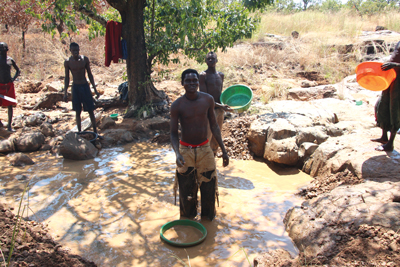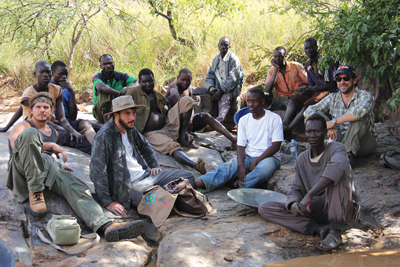 |
| Artisanal mining is a common source of income in Uganda, where Rakai Resources helps provide training in other professions. |
At around 3 a.m. on a frostbitten Vancouver night in early 2013, the phone jolted Stephen Burega, CEO of Rakai Resources Ltd., awake: two men with forged company documents were caught by locals trying to poach minerals from near the junior’s exploration-stage gold asset in a hardscrabble northern Uganda, 8,700 miles away.
Immediate intervention by village residents, he recalled, was a welcome surprise—and testimony to strong community trust from early-stage corporate social responsibility (CSR) for any size mining resource. Moreover, as head counts are slashed and fleets parked amid convulsing demands industry-wide, Rakai is defying the odds by demonstrating how innovation-driven sustainability can yield pioneering CSR in a post-conflict frontier market.
Rakai’s initiative helping artisanal miners at their Abim project, in particular, has won recognition and offers of collaboration from trade associations, nonprofit and government organizations the world over—from UNICEF to Canada’s Department of Foreign Affairs and Development (DFAT-D) to the U.K.-based International Institute for Environment and Development (IIED).
This is no mistake. Rakai, according to Burega, is considered “challenging the framework” of global CSR, having partnered with Salama SHIELD Foundation (SSF), a prestigious Ontario-headquartered charity founded by an anthropologist famed for research in the years following 1992 when an HIV/AIDS pandemic spread across southwest Uganda, an East African nation of 36.8 million long synonymous with war, poverty and food insecurity.
“The community is enabled throughout the exploration process,” Toronto-based Burega added, “whether the project becomes large scale or not;” the SeedRock Group, a sustainability-focused natural resources and energy firm, active in Burkina Faso, Mali, Namibia and Colombia, has also joined the equation.
SSF, which promotes local health and finance through participatory development, allows Rakai a social component replicating successes from south central Uganda and neighboring Malawi. It enjoys a win-win economic model to “solve sustainability and lack of funding, allowing organizations to focus on their mission rather than fundraising,” said SSF founder Dennis Willms. “Cross-sector partnerships support a variety of activities.”
Rakai and its partners, to this end, are gifting the community with a 5% equity stake in Rakai Resources, 10% of profits from small scale mining; and a 10% equity stake in all joint venture (JV) opportunities within Abim District. Rakai further boasts a board of governors chaired by community members, each one elected by a Community Advisory Committee (CAC) of local stakeholders, all responsible for dispersing 4.5% of fund allocation annually; company officials maintain fiduciary responsibility.
PIONEERING THROUGH PARTICIPATION
Salama is Kiswahili for “peace,” “security” and “safety” and SHIELD is an acronym for “Sustaining Health Initiatives, Enabling Local Development.” Both are based on “Mbuntu,” an African philosophy of interconnectedness, said Willms. Key to its track record are “Conceptual Events”: Echoing voluntary Free Prior and Informed Consent (FPIC) guidelines, they engage stakeholders including local mentors and participants like religious leaders, elders, local council leaders, traditional healers and orphans, as well as youth representatives and health service providers; beginning in Q3 2013, community consultations continue expanding as SSF advances its programs.
Most unique, however, are Rakai-SSF initiatives addressing children, young adults and women in artisanal mining, an illegal trade rife with exploitation, associated with human rights abuses and an engine for violence across the continent. Jointly with Canada’s International Resource and Development Institute (CIRDI), Rakai and SSF are advancing education allowing artisanal and small-scale mining (ASM) miners both formal mining skills and alternative, legitimate career opportunities outside the sector; current artisanal work, noted Burega, supplements incomes in the region including agriculture and animal husbandry.
 |
| Rakai also helps train artisanal miners in conventional mining techniques. |
PHILOSOPHY AND GEOLOGY
Since Abim’s artisanal miners extract considerable gold during the rainy seasons, highlighting production possibilities in the area, Rakai has also recruited two international experts to assist in alluvial gold mining, noted Burega; ore they help discover by techniques separating microscopic fragments from gravel, he added, will further subsidize mineral exploration and social development.
Wayne Dunn, a professor of CSR at McGill University and president and founder of the CSR Training Institute, noted the value of early-stage local commitments cannot be overstated—especially as mineral deposits see changes in ownership. “Early mistakes in social license reverberate,” he said. “Communities don’t make a distinction between mining companies.”
TMT Mining Co. Ltd., a firm of young Ugandan consultants working with Rakai, agreed. “Their aim of bringing a community-based profit sharing to CSR,” said Director Nasasira Hillary, “ushers in a
new generation of mining that will uplift Uganda’s mining industry.”
Since many financial institutions are only now beginning to see CSR as risk mitigation, here, too, Rakai seeks to break new ground. “No one is rewarding ‘outperforming’ sustainability-oriented miners for social performance ahead of or during production,” he said. “Investors perceive CSR as a preventative measure—we see it as good business and are pursuing investment accordingly.”
In 2013, a group of top mining CEOs visited the Vatican for a “day of reflection,” noted Burega. “Nontraditional investors—faith-based organizations, philanthropists, social impact investors—all have a stake in economic development,” he added. “And we’re working to get the word out—while boosting the industry’s reputation in the process.”






